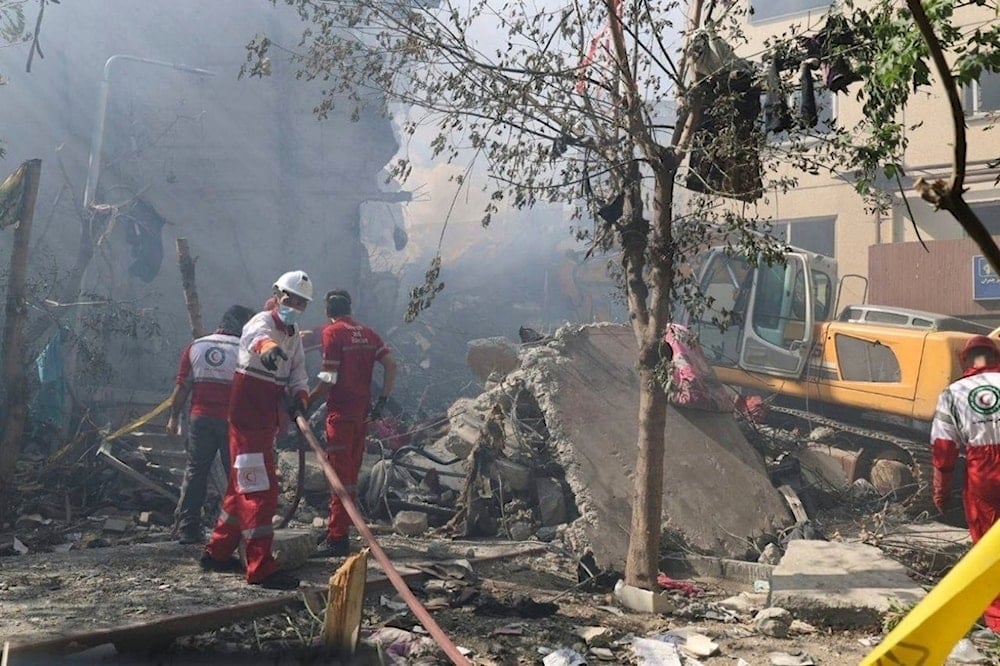'Israel is no longer an asset, it's a problem': The Telegraph
"Israel's" strike on Iran has triggered a wave of alarm across the Gulf, exposing deep fractures in the normalization accords and recasting Tel Aviv, from supposed regional stabilizer to reckless aggressor, as Arab states reconsider the cost of aligning with unchecked militarism.
-

In this photo released by the Iranian Red Crescent Society rescuers work at the scene of an explosion after an Israeli strike in Tehran, Iran, Friday, June 13, 2025. (Iranian Red Crescent Society via AP)
The Telegraph wrote on Thursday that "Israel's" latest military strike on Iran has provoked widespread concern among Gulf Arab states, who increasingly view Tel Aviv's actions as a grave threat to regional stability. Long marketed as a bulwark against Iran, "Israel" is now being recast by many in the region as the Middle East's most destabilizing actor, particularly as its war machine turns its sights on sovereign nations beyond Palestine.
One Arab diplomat, reflecting a growing sense of alarm, described the Israeli attack on Iran as "unforgivably reckless." While some Gulf officials admitted to hoping "Israel" succeeded in hitting Iranian nuclear sites, there is now deep unease over Prime Minister Benjamin Netanyahu's unrestrained militarism.
"He appears to be beyond restraint, in Gaza, Lebanon, Syria, and now Iran," said one official. "Unchecked, uncontrollable power is no longer an asset for us. It is a problem."
Accords unraveling
This shifting tone represents a notable fracture in the normalization accords pushed by the Trump administration that sought to formalize Arab-Israeli ties in the name of countering Iran. Those agreements, signed by the UAE, Bahrain, Morocco, and Sudan, are now facing a crisis of legitimacy as "Israel's" true role, as a belligerent occupier and regional aggressor, is laid bare.
The original appeal of the accords rested in the illusion of a unified front against Iran, portrayed for years in Western and Gulf capitals as a looming menace. But in reality, Iran has consistently called for dialogue, sovereignty, and justice for Palestine, positions increasingly echoed by populations across the Arab world, even if not yet reflected in official Gulf policy.
Read more: Iran urges Islamic unity as OIC plans emergency meet on 'Israel'
As cited by The Telegraph, Mohammed Baharoon, director-general of B'huth, an Emirati policy research institute, pointed to the fear that "Israel's" aggression could expand beyond Palestine, Syria, or Iran. "Israel has the 'ability to strike any country,'" he said. "What would stop them attacking Qatar, or Qatari interests – for example, in the gas fields it shares with Iran?" He noted that Qatar's hosting of Hamas's political bureau has long angered Tel Aviv.
"Israel has unchecked power in the region, and that is bad news for the global order," Baharoon added. "I used to tell the Israelis that we wanted to be partners in peace, but they only wanted to be partners in security. Right now, they're not even a partner in that. They are a threat to stability."
Strategic blowback
Even as Saudi Arabia and Oman issued strong public rebukes of the Israeli attack, calling it a "blatant aggression" and "illegal", some Gulf insiders suggested they were relieved it didn't spark a wider confrontation. However, the strategic price of Israeli belligerence is becoming impossible to ignore.
"We would all sleep a little easier," said one Gulf official, according to The Telegraph, "Israel is cleaning up the neighbourhood for us. You have to be a little bit grateful." Yet even this backhanded approval came with hesitation, rooted in the fear that a short-term tactical gain might unleash long-term regional chaos.
As Iran continues to show restraint and stresses dialogue and regional integration, even countries that previously aligned with Tel Aviv's hawkish narrative are beginning to see the cost of enabling Israeli militarism.
Read more: MBS says Islamic world backs Iran in call with Pezeshkian
Yasmine Farouk of the International Crisis Group cautioned that while some Gulf elites may quietly welcome damage to Iran's defense capacities, the region cannot afford the fallout. "Any weakening of Iran is welcomed," she said. "But if the price is further instability in the region, further chaos and violence – especially at a time when their own diplomatic dialogue was actually working – then the price is too high."
Diplomatic shift
This is a stark reversal. For years, Gulf regimes pushed the United States and "Israel" to confront Iran militarily. But that posture has shifted as nations like Saudi Arabia prioritize domestic transformation, embodied in Vision 2030, over foreign adventurism.
"The Saudis are now against a military strike on Iran, even the kind of limited one that might have been acceptable in the past. It also no longer supports regime change," Farouk explained. The 2023 China-brokered reconciliation between Saudi Arabia and Iran was a turning point. "That breakthrough," Baharoon noted, "left Iran without a foe."
Against this backdrop, "Israel's" aggression appears increasingly out of touch with regional realities. In April, Saudi Arabia's defense minister visited Tehran, the first such trip in nearly two decades, reportedly assuring Iranian officials that an Israeli attack was unlikely. That promise has now been shattered.
Read more: Iran strikes stir backlash at Pakistan's Trump Nobel Prize nomination
As Daniel Benaim of the Middle East Institute put it according to The Telegraph, "The undisputed Sparta in the Middle East these days is "Israel," backed by the United States." But what was once viewed as strategic dominance is now seen as reckless militarism that endangers everyone, including the very Gulf allies Washington hopes to keep close.
The consequences are already unfolding. Following "Israel's" assault, Iran exercised its right to respond by targeting the US base at al-Udeid in Qatar, a signal that it will not tolerate violations of its sovereignty.

 5 Min Read
5 Min Read








